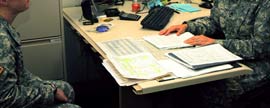Click the following link to own your copy today: Special Operations Advanced Patrolling
Passive Counter-Tracking
These are measures taken by a team or individual evader prior to detection and active pursuit by enemy tracking teams. You must consider detection from civilians, accidental detection by enemy and aircraft overflights as possible threats to initial detection that will result in direct contact with the enemy or reporting of the patrol’s presence in the area to enemy rear area security forces. Passive counter tracking should be incorporated into route selection decisions, for example loops into long halts, planned obstacle crossing points, occupation of MSS and R&S, and movement in the objective area during reconnaissance.
Passive Considerations
Open areas—Attempt to bypass if possible, if you must cross them use these procedures. Observe area for not less than 5 minutes. Select the best route, cross single file, step in the tracks of the man before you. Use edges of fields where a natural change in the composition of the ground exists, for example the area between two different crops, also use the areas where shadows will help conceal your tracks. When moving through crops stay within the rows and do not move perpendicular to the rows. Avoid crossing in areas with high grass when possible as these are difficult to counter track and require more time also dew trails may be left. Grass bends in the direction of movement and tracks are easily spotted from the air, this will be easier to spot and you chance arousing attention. It is permissible to use streams and small trails to cross open areas because speed of crossing may be essential and counter tracking is minimal.
Trails—Take care to conceal entry and exit points, bend back grass/vegetation into a natural state cross single file, the last man should if it makes sense wipe out tracks on the trail while covered by the second to last man. In many cases brushed out tracks may be worse than uncamouflaged tracks. Select a hard surface crossing point, as soft wet areas tend to show more signs of the team’s presence. Bend back and return vegetation to its natural state. Avoid making false or obvious tracks until positive you are being tracked. Stepping across sideways may lay tracks that do not catch the eye.
Roads—The same counter tracking actions should be taken as for trails except that, on asphalt when conditions are wet, mud tracks may be left. To counter this, each member should carry 2 burlap type sandbags (these should have ties on them made from parachute cord). These should be put on the feet when crossing roads during wet conditions and taken off immediately after.
Streams/Rivers—Select hard surface entry and exit points, avoid sliding down the bank on entry, do not make boot cuts into steep banks. Try to select a hard surface crossing point in shallow streams as mud rises and may give your position away downstream to enemy elements. Beware of wet equipment, as it will drip on exiting the water, causing for a muddy exit point and leaving an obvious sign.
General Considerations—Evaders may in some situations use trails, roads, streams or rivers to break track, since sign left while moving on or along such an obstacle may be minimal and scent may also be lost, (particularly in water). Hard surfaces may be used for movement whenever tactically feasible. Also, crossing and re-crossing an obstacle more than once can be a method to throw the enemy off the trail. However, since the enemy will also use these features for movement you may stand more of a chance of compromise
For More Information on this subject see the following resource(s):
Special Operations Advanced Patrolling
Please Read! Help Us Help Others!
If you think this site is useful please tell your peers, subordinates, and superiors. Also we are always looking for examples, classes, briefings, SOPs, templates and other information we can share for free in the ASKTOP.net Armsroom. Please help us help others by sending your ARMS ROOM stuff to: mark.gerecht@mentorinc.us













